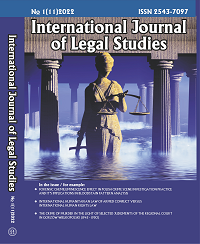SĄDOWA KOREKTA AKSJOLOGICZNA PRAWA PODATKOWEGO – UWAGI W KONTEKŚCIE ZWOLNIENIA DLA OSÓB NAJBLIŻSZYCH
W PODATKU OD SPADKÓW I DAROWIZN
THE JUDICIARY'S AXIOLOGICAL REVISION OF TAX LAW - COMMENTS IN THE CONTEXT OF EXEMPTION FOR THE NEXT OF KIN
IN INHERITANCE AND GIFT TAX
Author(s): Konrad ZającSubject(s): Public Law, Fiscal Politics / Budgeting, Administrative Law
Published by: Międzynarodowy Instytut Innowacji "Nauka - Edukacja - Rozwój"
Keywords: 0.5281/zenodo.6891868
Summary/Abstract: The article discusses the issue of judiciary’s axiological revision of tax law as an important source of legal protection of the taxpayer in administrative court proceedings. The problem was analyzed on the basis of the institution of exemption for the next of kin in the Polish inheritance and gift tax act. The author's standpoint is that the failure to observe the substantive timelimit for notification of acquisition of property or property rights should not, in every situation, definitely deny the taxpayer's right to tax exemption. The judiciary's application of the law should not exclude entirely the assessment of the circumstances of the individual case, particularly the arguments put forward by taxpayers to justify the reasons for failure. Specific and extraordinary circumstances of the case may indeed justify the need for an axiological revision of relevant legal provisions. The purpose of axiological revision is to realize the normative character of constitutional principles and their overriding significance for the legal system. The maxim dura lex sed lex should not be raised to the status of a dogma, thereby depriving the court of the possibility to dispense the justice in concreto. The judicial independence, which is a fundamental premise in the administration of justice, means that a judge is bound first and foremost by the norms of the Constitution. The author identifies selected categories of cases, whose extraordinary circumstances justify the necessity for the court to undertake an axiological revision of the provisions. The article attempts to take issue with the settled case-law, according to the noncompliance with a formal requirement, results in the loss of the right to the tax exemption, regardless of the reason of the failure. The paper also encourages reflection on the ideas of justice, fairness, adequacy, principle of citizen's trust in the law established by the state, and the implementation of these principles in the judiciary's application of the law
Journal: International Journal of Legal Studies (IJOLS)
- Issue Year: 11/2022
- Issue No: 1
- Page Range: 23-59
- Page Count: 37
- Language: Polish

